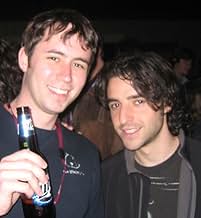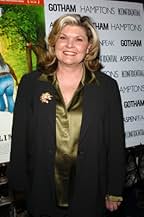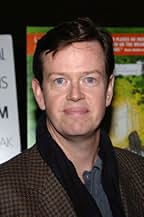Aviva tiene trece años, es torpe y sensible. Su madre Joyce es cálida y cariñosa, al igual que su padre, Steve, un chico normal que tiene un temperamento feroz de vez en cuando. Gira en torn... Leer todoAviva tiene trece años, es torpe y sensible. Su madre Joyce es cálida y cariñosa, al igual que su padre, Steve, un chico normal que tiene un temperamento feroz de vez en cuando. Gira en torno a su familia, amigos y vecinos.Aviva tiene trece años, es torpe y sensible. Su madre Joyce es cálida y cariñosa, al igual que su padre, Steve, un chico normal que tiene un temperamento feroz de vez en cuando. Gira en torno a su familia, amigos y vecinos.
- Dirección
- Guionista
- Elenco
- Premios
- 3 nominaciones en total
- Dirección
- Guionista
- Todo el elenco y el equipo
- Producción, taquilla y más en IMDbPro
Opiniones destacadas
In terms of film-making, it is fairly innovative in technique, although audiences who have tired of director Todd Solondz's previous offerings (which include 'Storytelling' and 'Happiness') may say it is more of the same thing. A central new twist with Palindromes is that the central character a twelve/thirteen year old girl is played quite convincingly by a wide array of characters that are physically very different (black/white, obese/skinny, young/old, and in one incarnation even a young boy). They all have an eerie likeness and it is a credit to Solondz that, even without being warned of the device, audiences have barely a second's hesitation in linking up that it is the same person.
Aviva (her name is palindromic - spelt the same forwards or backwards) is 12 or 13 years old but has a very strong desire to have a baby. This is presented as quite a core issue with her, rather than a passing whim. Her mother reels between hysterical intolerance and forceful supportiveness, trying to be a 'good mother', feeling inadequate at the job, and making strident attempts to steer her wayward daughter. When Aviva first expresses her wish it's along the lines of wanting lots of babies so she will always have someone to love (she is a sweet and lovable, slightly chubby, black child and the wish is not taken to mean immediate action at this point). When she makes fumbling attempts to realise her aim with a boy about the same age she knows, we start feeling worried, even though the scene is trivialised and offered as humour. Solondz repeatedly tempts us to laugh at or with the characters during tragically gruesome scenes and then feel guilty about it. Aviva doesn't give up, even when we know her quest has become impossible.
One of the ways we test a proposition is to say, 'what are the exceptions'? Does it apply under all conditions? An Internet psychology test used rapid responses to demonstrate that, even people who think they are not racially prejudiced, still instinctively tend to view black people differently. We have innate prejudices about colour, gender, age, size/obesity that are not easy to overcome. Palindromes, by taking one character and showing her in many physical forms, makes us ask ourselves if we think differently about her situation when we give her a different physical form. If we feel sorry for her in one incarnation but less so (or more so) when her physical appearance is changed, what does that say about us? Similarly, if we make a judgement about a person, or about what is 'best' for a person, would it be the same if we could see into the future or different futures? The film's apparent premise (stated within the movie) is that we are always the same, we can't change, even though we grow older, may have a boob job or sex change, we are fated to be the same person we always come back to being who we are (a bit like a palindrome, that is spelt the same whether read left to right or right to left). 'How many times can I be born again?' screams a lapsed 'born-again' paedophile later in the movie. Is a person really fated to not be able to change? What might be truer would be to say that it takes a lot for people to change, to overcome natural hubris and unchanging habit if we are each individually a product of our genes, our environment and our inner will (or 'soul' for religious people), then real change has to be not just more than skin deep but deep enough to overcome external influences and predispositions. (When watching Palindromes, look out for the Wizard of Oz references!) But ultimately Solondz neither philosophises nor moralises he simply observes. That he observes such controversial, dilemma-ridden and offensive subject matter may provoke constructive thought in some (especially if you think he does it in a caring way) but derision in others. His pessimism is tempered by the fact that he gets away with it quips Solandz - "It says something good about mankind and people's discretion that when I walk in the street to pick up my groceries nobody has assaulted me."
I think this is a great movie for people with daughters. If this movie doesn't make you want to be a better parent then I guess there is no hope after all. Well, I'm finally closing in on 200 words, I could have definitely stopped after saying "people had to laugh because if they didn't they would have to cry."
Many times Solondz's films are misunderstood. They are often deemed sacrilegious, vulgar, or plainly disgusting. If you are one of these people shame on you, Solondz simply explores and exploits major issues that happen everyday. No other director besides Larry Clark is bold enough to do this. Personally, I think the dialogue in Solondz's films is brilliant and witty. He chooses tasteful casts that depict their characters perfectly. The audience is able to easily relate to the characters or simply hate them. I praise Solondz for his work.
If you haven't seen the film, please stop reading here.
In this new film, Todd Solondz takes us back to the Wieners, the family that he introduced to us in his debut, as we watch the closed casket of Dawn. At the same time we are shown another family that are related to the Wieners, the Victors. The director loves to examines the family dynamics, as it's the case with the study he does on the Victors.
Aviva Victor is a girl who wants to have a child. Alas, it's not going to happen any time soon. We see, in painful detail what this young woman does to her suburban parents. Joyce, the mother, is shocked and horrified. There's only one thing in her mind to do: Aviva is made to have an abortion, to which she doesn't agree, but one that is forced on herself.
Joyce, the materialistic mother, in a scene that is about the best thing in the film, tries to reason with Aviva and offers her own story about how she had also aborted a baby, who would have been named Henry, after her father. Her motives are purely based on whatever sacrifices the arrival of the unwanted baby would have meant in the Victors life.
Aviva, after the botched abortion by Dr. Fleisher, takes to the road in a way to show her rebellion against what has been forced on her. Aviva, for her young age, is extremely wise as to what to do and what to expect from the different people she meets along the way.
The device by Mr. Solondz to have eight different actors play Aviva, pays up in a way one wouldn't even have thought it would. Each one of the actor/actress leaves his/her own imprint in playing this disturbed girl. The most appealing of the different people playing the girl is the "Sunshine Aviva", the Afro-American that makes quite an impression in her take on this sad lost soul.
When Aviva is found by the side of a brook, the kind Peter Paul brings her to the Sunshines' home. These amazingly couple are too good to be true, as one discovers later on. The motherly Mama Sunshine is anyone's idea of how a mother should be. Not having family of her own, they have taken about a dozen children, each with a physical problem, but who appear to lead a happy existence with the Sunshines.
Peter Paul takes Aviva one day to the dump site where some of the discards from the abortion hospital take the fetuses. Aviva is horrified, she identifies to the fact that wanting to have a child of her own, this reality hitting her in the face is too much for her. Aviva then takes to the road again with the man she has had a sexual encounter before. This proves fatal as he is a man on a mission, an executioner that acts for the hate group that the Sunshines belong to.
The film is multi layered with an incredible texture between the adventures Aviva experiences. "Palindromes" is a hypnotic film. Any viewer falling under its spell is in for a magic ride guided by Todd Solondz.
What the director has gotten from this talented cast is one of the best ensemble playing from any indie film this year. Ellen Barkin has one of the best moments of her career as Joyce Victor in the sequence where she tries to explain to Aviva the reason for aborting. Debra Monk, a fine, but underused actress, is magnificent as Mama Sunshine. Ms. Monk's appearance shows us a woman that on the surface is something, when in reality she is a monster. Sharon Wilkins, the "Sunshine Aviva" gives a compassionate reading that reveals so much of the young girl she represents. Alexander Brickel's Peter Paul, the boy that befriends Aviva, plays the sweet boy perfectly. Also in the cast, the wonderful Stephen Adly Guirgis, who plays the right wing enforcer fanatic.
Mr. Solondz is to be congratulated in getting a tamed performance from the otherwise intense Jennifer Jason Leigh, who plays one of the most quiet Avivas.
This film proves that Mr. Solondz loves to takes chances in telling stories that are dark and not commercial, but he makes them resonate with his viewers because he doesn't compromise with what he perceives as the truth around him. This is a man who is not a wishy washy when it comes to taking chances in being an original.
¿Sabías que…?
- TriviaHeather Matarazzo turned down reprising the role of Dawn Wiener in this film.
- ErroresAviva is cradling a baby doll in her hands, then her mother comes in and they talk, and Aviva puts the doll down on the bed. During the conversation the doll's clothes change and the doll's position also changes a few times during the scene.
- Citas
Mark Wiener: People always end up the way they started out. No one ever changes. They think they do but they don't. If you're the depressed type now that's the way you'll always be. If you're the mindless happy type now, that's the way you'll be when you grow up. You might lose some weight, your face may clear up, get a body tan, breast enlargement, a sex change, it makes no difference. Essentially, from in front, from behind. Whether you're 13 or 50, you will always be the same.
'Mark' Aviva Victor: Are you the same?
Mark Wiener: Yeah.
'Mark' Aviva Victor: Are you glad you're the same?
Mark Wiener: It doesn't matter if I'm glad. There's no freewill. I mean, I have no choice but to chose what I choose, to do as I do, to live as I live. Ultimately, we're all just robots programmed abritrarily by nature's genetic code
'Mark' Aviva Victor: Isn't there any hope?
Mark Wiener: For what? We hope or despair because of the way we've been programmed. Genes and randomness, that's all there is and none of it matters.
'Mark' Aviva Victor: Does that mean you're never going get married and have children?
Mark Wiener: I have no anent desire to get married or have kids. But that's beyond my control. Really, it makes no difference. Since the planet's fast running out of natural resources and we won't make it into the next century.
'Mark' Aviva Victor: What if you're wrong? What if there is a God?
Mark Wiener: That makes me feel better.
- Créditos curiososIn loving memory of Dawn Wiener.
- ConexionesFeatured in Cavities (2004)
- Bandas sonorasLullaby
(Aviva's and Henrietta's Theme)
Written by Nathan Larson
Performed by Nina Persson and Nathan Larson
Selecciones populares
- How long is Palindromes?Con tecnología de Alexa
Detalles
- Fecha de lanzamiento
- País de origen
- Idiomas
- También se conoce como
- Palíndromos
- Locaciones de filmación
- Kingston, Nueva York, Estados Unidos(Restaurant & parking lot scene with Bob & Aviva. Superlodge 129 Route 28)
- Productora
- Ver más créditos de la compañía en IMDbPro
Taquilla
- Total en EE. UU. y Canadá
- USD 553,368
- Fin de semana de estreno en EE. UU. y Canadá
- USD 57,251
- 17 abr 2005
- Total a nivel mundial
- USD 809,686
- Tiempo de ejecución
- 1h 40min(100 min)
- Color
- Mezcla de sonido
- Relación de aspecto
- 1.85 : 1























